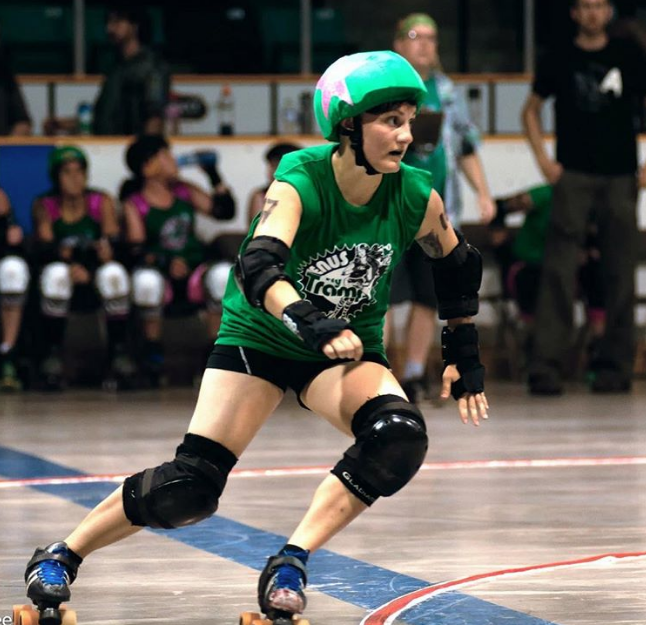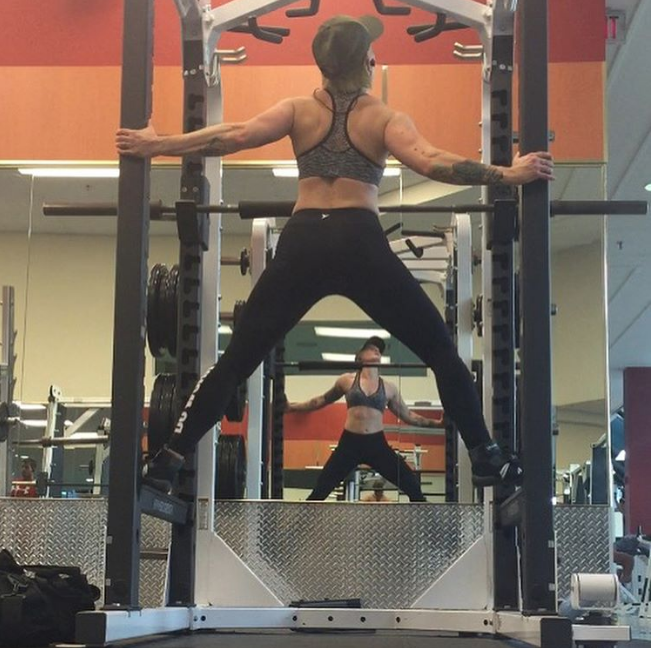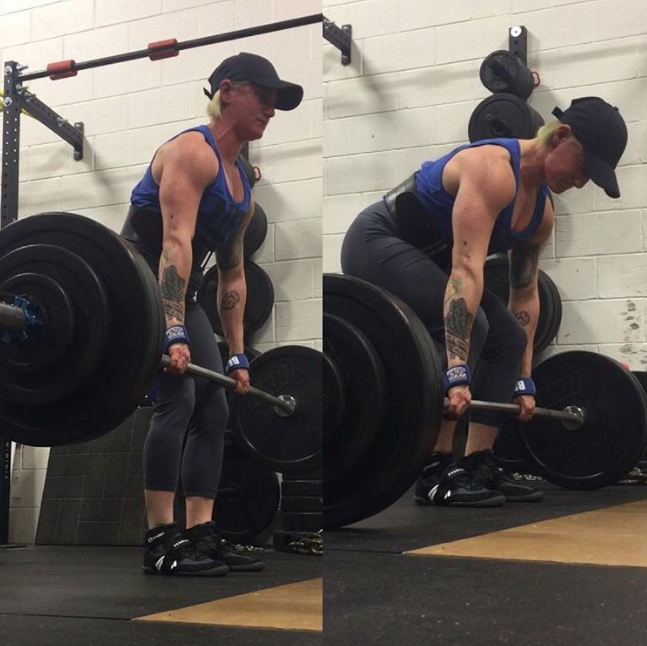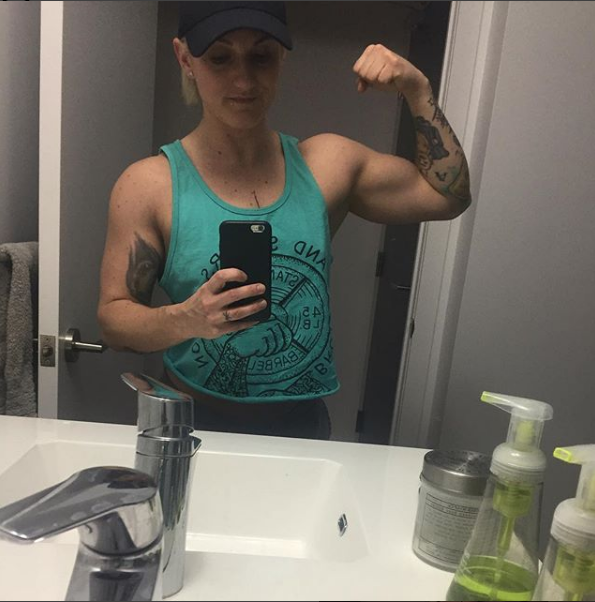In October of last year, 5’1 Elyse Wellhauser broke three Canadian powerlifting records, including a jaw-dropping 347lb deadlift. She weighs 53kg—that’s about 116lbs. Although it happened at her third-ever competitive meet, the success was far from instant. Elyse ultimately left her first competition in objective failure, and has worked through an eating disorder, the dissolution of a marriage, and hours of training to get to where she is now. She’s strong as hell, has goals for days, and she’s making waves—even though she’s only been in the sport for less than two years.
In The Beginning
Elyse considers powerlifting her first serious foray into exploring her full capability as an athlete. She played some soccer growing up. She also skated for TCRG, a local roller derby league where she was captain of The TKO’s under the name Tiny Dancer. None of those required the physical or mental discipline that she has honed more recently in powerlifting.
Prior to competitive powerlifting, the Ontario-born athlete trained in a typical commercial gym, with generic training programs pulled from Bodybuilding.com, where muscle groups are split up and focused on alternate days of the week. According to Elyse, this produced physical results, but never gave her purpose or something to work towards.

“I never wanted to go on stage, I always thought it was really superficial,” she reflects. She points to the fact that figure competitions are subjective, unlike the cut-and-dried nature of lifting as a sport.
“In the sport, you either lift it or you don’t. So there’s no judging on what I look like in a bikini.”
Most powerlifting competitors have a training life of three-to-five years before going competitive, but Elyse has only been training for 17 months. She credits her successes to finding the right coach, and training her mind as well as her body. She has overcome and sacrificed.
Lifting has built her a solid foundation, comfort, and a way to express ambition. Last year, she says committing herself to her powerlifting helped her through the dissolution of her marriage.
“Powerlifting was the foundation that I turned to,” she says, adding that it gave her stability during that painful and turbulent time. “Even the mundane [training] work that I do all the time, that’s what makes me happy and has given me a purpose. Now I’m happy.”

Picture This
Then there was the time she bombed her first competition, which happened after officials accidentally set the starting weight heavier than listed, causing a doubt-infused domino effect.
“It felt completely different, ‘cause I thought it was going to be the weight my coach and I had chosen as my opener, and it came out heavier. It basically spun me for a loop,” Elyse remembers. “I’d been training for almost a year at that point. It was a very humbling experience.”
She only completed three out of nine lifts that day—a 33.3% success rate. Instead of quitting the competition set entirely, her immediate reaction was to buckle in, recommit, and begin work for the next one.
“I was determined. I was like ‘no, we’re going to do this again and we’re going to do this properly.’”
“With strength sports you sort of have to surrender.”
“Properly” meant adding visualization—ramping up her mental game to match the physical training she was doing. Months before a meet, Elyse imagines herself making lifts—the kind that break records.
“I’m seeing the crowd. I’m feeling all of the tension, the anticipation,” she says. “I’m doing this all before I’ve even hit the platform, by the time I get there I’ve already visualized everything I need to do completely.”

Using this technique and working with a coach and training partner, Elyse got 8 of 9 lifts at her second and third meets—including her national record-breaking lifts. According to her, the victory was difficult to grasp, a surreal experience.
“The day of, you’re so wired up. After a lift it’s like euphoric, right? Then I got the certificates in the mail.” Rather than celebrating, she focused on the next big prospect, the next goal weight, the next competition. This means months of build up culminate in one day, 9 lifts, 9 moments of either make or break.
This high stakes approach means she’s committed, and changed her life to adapt to a training schedule.
“Everything I do, everything I eat, when I sleep, what supplements I take—it all revolves around my training,” Elyse says. “My friends have adjusted. My family thinks I’m crazy, but they understand it’s what I’ve chosen to do.”
The Heavy Lifting
This might seem like a magic formula. Bad competition + visualization = good competition? Think again. Elyse trains four times a week—zero cardio on coach’s orders.
“Mentally, I don’t always want to be training, but you do it, you put it in the work, and the result is on stage,” she says. It can get monotonous, but keeping to a strict schedule has allowed her to thrive.
Choosing to lift also means facing the emotional challenges that changing her body brings to the surface. As Elyse builds muscle, she says things like not being able to fit into her clothes bring up disordered eating issues and questions of body image.
While crossfit gyms have started to make the idea of strong women much less taboo, there’s still something of a stigma when it comes to women who lift—it shows in things like men giving unsolicited advice at the gym, or asking women if they’re worried about becoming bulky.

“With strength sports you sort of have to surrender. For a lot of women they want to look a certain way but they also want to be strong—you can’t always have both,” Elyse says. “It’s made me evaluate my relationship with my body. All of those issues have risen to the surface and I have to still take stock of how I’m feeling and why I’m feeling that way.”
Her immediate network—friends and co-workers have been supportive of this journey. Often times, other women will compliment her and say they wish they could do what she does. Her response? “You totally could, if you actually commit to it!’”
She recommits every single day and handles the issues one moment at a time. After all, she’s not one to linger in the present for too long—the future holds more appeal.
In terms of leveling up her own commitment, Elyse aims to hit the international stage. She wants remain injury free. She wants to inspire other women to try lifting, and recommends anyone who might be interested to reach out to other lifters on social media like Instagram for guidance, advice, or questions. Their barbell is far worse than their bite.
“I want to be a competitive athlete in this sport … to empower other women,” she adds. Some day, she might even add coaching to her own roster.
On top of all of this, she works in oncology as a clinical research coordinator, which means her days full of clinical trials and cancer patients—it’s taught her plenty about doing what you want and living your best life.
“I’ve learned you only have one life, and it can be compromised at any time. Do things that make you happy,” she says. Existence without her sport? Impossible. “I literally can’t imagine my life without it.”
There’s the kind of strong you can measure in numbers and the kind you can’t—Elyse Wellhauser is both.
You can find Elyse on Instagram as _elysepearl.
For more #StartingLines click here!
Don’t forget to follow us on Twitter, Facebook, and Instagram!